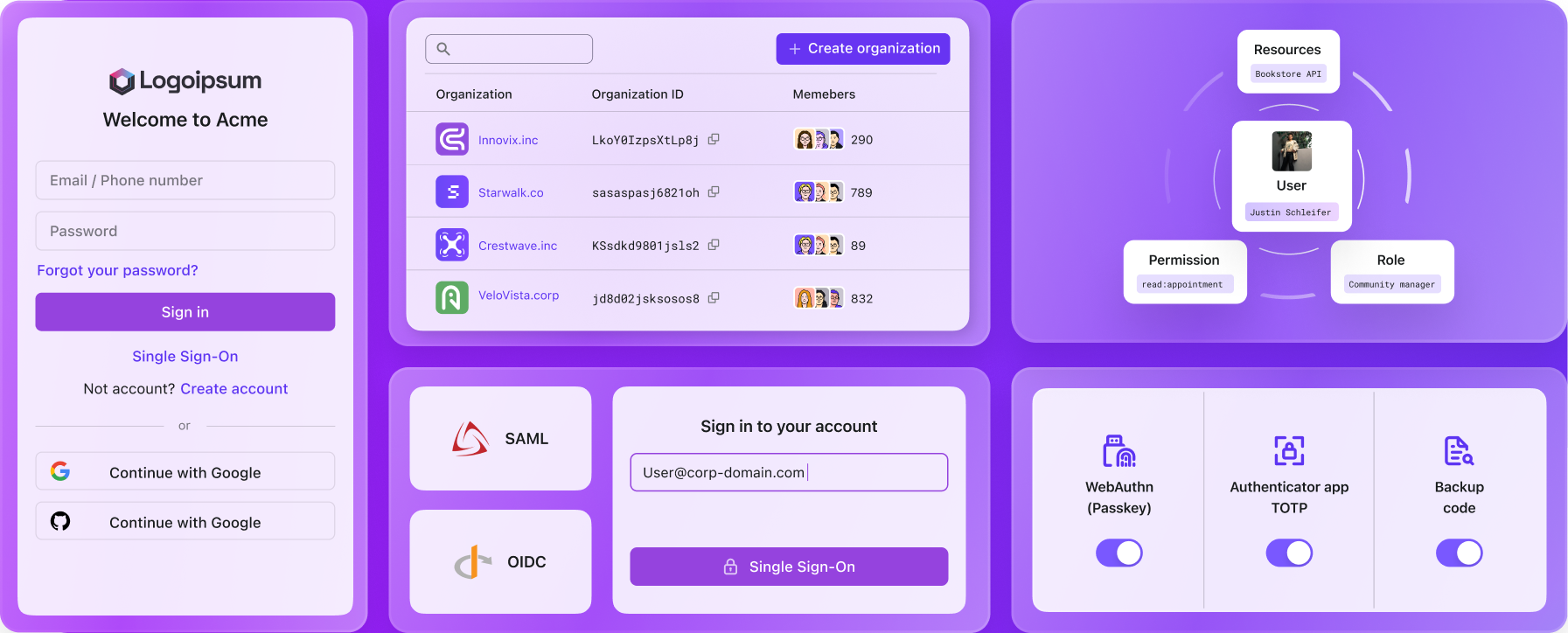Why you should incorporate an identity solution from the start
Learn the benefits of incorporating an identity solution from the beginning of your product development.
We have discussed the considerations for building our own authentication. In this article, we'll take a look at the advantages of incorporating an identity solution right from the start of your product development.
Boost your product development
A good identity solution can smoothly integrate into your product, expediting its readiness for use. With the identity solution, it will usually take a few minutes to hours to initiate the authentication feature, and you can focus on your product development.
Mitigate growing complexity
Often, we start with basic authentication methods like usernames and passwords or a single social sign-in option for our initial proof-of-concept. However, as our application expands, the need for enhanced security and additional authentication methods arises. While they are crucial, they may not be the core focus of our product.
Introducing a professional identity solution from the start can help to curb the escalating complexity over time, since it will provide all the necessary features with the growing needs of your product.
Example: Imagine developing a collaboration platform for businesses. Initially, you may only offer email-based sign-up. As your user base grows, you'll need to support single sign-on (SSO), two-factor authentication (2FA), and more. Starting with a comprehensive identity solution ensures a smoother transition and maintains user convenience.
Avoid migration headaches
Since identity forms the foundation of your product, migrating to a new solution as your product grows can be prohibitively expensive. This transition entails not only development costs but also potential disruptions to the user experience.
Example: Suppose you're building an e-commerce platform. Switching identity providers midway could lead to issues like lost customer data, disrupted order histories, and friction during the login process. Starting with the right identity solution avoids such complications.
The using of all-in-one development platform
Certain all-in-one development platforms offer identity components, but these features typically aren't their primary focus. If you're targeting a specific industry or developing a business-to-business product, it's essential to assess whether the included identity component aligns with your long-term requirements. Otherwise, you might find yourself needing to migrate when your product expands.
Example: If you're creating specialized software for the healthcare sector, the identity component in an all-in-one platform might lack the necessary compliance features required for handling sensitive patient data. In such cases, starting with a specialized identity solution is a prudent choice.
Beyond authentication
An effective identity solution goes beyond authentication; it encompasses authorization, user management, and a host of other features. These elements lay a solid foundation for your product, providing structured and high-quality user data right from the start.
Example: Building a social media platform? An advanced identity solution not only ensures secure logins but also manages user roles, permissions, and profile data, allowing you to focus on creating engaging features and analyzing user behavior without worrying about the underlying infrastructure.
Prioritize security
As your product gains traction, security becomes increasingly paramount. Rather than grappling with security concerns such as cyber threats, data breaches, and account takeovers, you can concentrate on advancing your product development while the identity solution handles security matters.
Example: In the financial technology (fintech) sector, protecting sensitive financial information is paramount. An identity solution with built-in security measures can help safeguard user accounts and financial data, allowing you to focus on enhancing the fintech services you offer.
Enterprise-readiness
If you intend to market your product to enterprises, integrating with their existing identity providers, such as Google Workspace or Okta for single sign-on (SSO), can be a deal-breaker. Many large corporations also require multi-tenancy capabilities, and employing an identity solution can help you achieve this without extensive custom development.
Example: Suppose you're developing software for project management and collaboration. Enterprise customers often demand seamless integration with their existing identities, along with the ability to manage multiple teams and projects within a single tenant. Utilizing an identity solution that supports SSO integration and multi-tenancy can make your product much more appealing to these enterprise clients.
Conclusion
A well-chosen identity solution can significantly accelerate your product development, mitigate the complexity that can arise over time, and provide a stable foundation for your product. Moreover, it enhances security and delivers organized user data from the very beginning, setting the stage for your product's long-term success.

